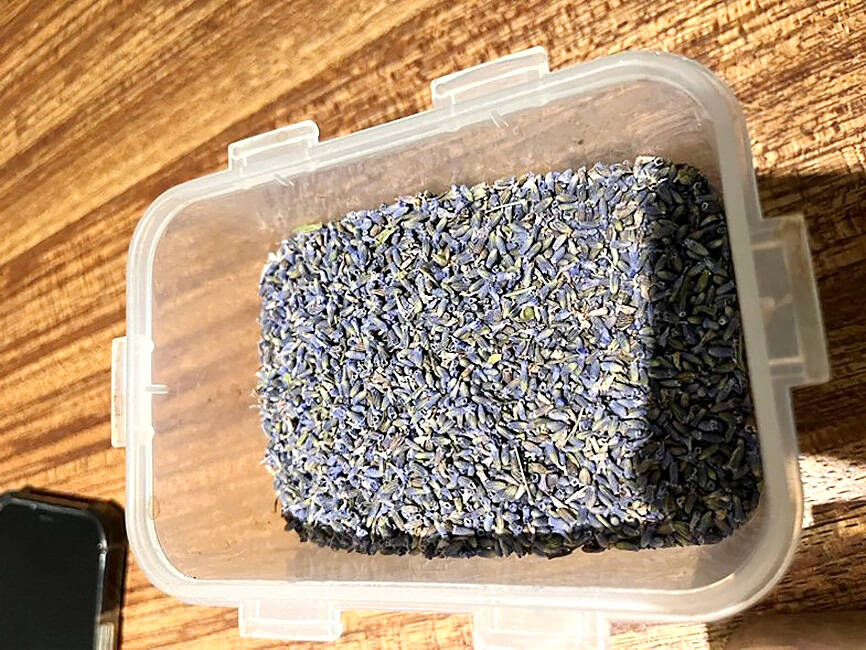The Taipei Department of Health yesterday said a random inspection uncovered six types of tea with excessive levels of pesticide residues.
The department conducted the inspection of tea-leaf and floral tea products sold at supermarkets, retailers, tea shops and beverage shops in the city, testing them for pesticide residues, Food and Drug Division Director Lin Kuan-chen (林冠蓁) said.
Of the 50 items tested — including 26 tea-leaf products and 24 floral tea products — six failed, or 12 percent, Lin said.

Photo courtesy of the Taipei Department of Health
The failed products include two rose tea products, two lavender tea products, and one of each blue tea (Clitoria ternatea, also known as butterfly pea tea) and an osmanthus tea product, she said.
They were each found to have one to seven types of pesticides at residue levels exceeding the Standards for Pesticide Residue Limits in Foods (農藥殘留容許量標準), she said.
The blue tea product was imported as “personal use” and the importer did not apply to the Food and Drug Administration (FDA) for inspection of imported foods and related products according to the law, Lin said.
The department has asked the retailers to remove the products from shelves and prohibited them from selling the tea, she said.
As one of the rose teas and the osmanthus tea were supplied from other cities or counties, their local health departments have been informed, while the sources of the remaining products are in Taipei and would be dealt with according to the Act Governing Food Safety and Sanitation (食品安全衛生管理法), she said.
The blue tea product was found to contain residues of pesticides including cypermethrin, fipronil, fipronil sulfone, imidacloprid, metalaxyl, pyridaben and lambda-cyhalothrin, all exceeding their maximum allowable limits, department data showed.
Products that were found with excessive levels of pesticide residues could face a fine of NT$60,000 to NT$200 million (US$1,848 to US$6.2 million), while importing food products and selling them without applying for FDA inspection can result in a fine of NT$30,000 to NT$3 million, Lin said.
The department urges tea importers to develop a food safety monitoring plan, including enhancing self-initiated inspections by sending ingredients, semi-finished products and final products for regular examination, she said, adding that retailers should keep products’ certificates of origin for better traceability.
Consumers can report food safety issues to the city’s 1999 hotline (or call (02) 2720-8889 if outside Taipei), the department said.
Inspection results are available on its official Web site.

Taiwan has received more than US$70 million in royalties as of the end of last year from developing the F-16V jet as countries worldwide purchase or upgrade to this popular model, government and military officials said on Saturday. Taiwan funded the development of the F-16V jet and ended up the sole investor as other countries withdrew from the program. Now the F-16V is increasingly popular and countries must pay Taiwan a percentage in royalties when they purchase new F-16V aircraft or upgrade older F-16 models. The next five years are expected to be the peak for these royalties, with Taiwan potentially earning

STAY IN YOUR LANE: As the US and Israel attack Iran, the ministry has warned China not to overstep by including Taiwanese citizens in its evacuation orders The Ministry of Foreign Affairs (MOFA) yesterday rebuked a statement by China’s embassy in Israel that it would evacuate Taiwanese holders of Chinese travel documents from Israel amid the latter’s escalating conflict with Iran. Tensions have risen across the Middle East in the wake of US and Israeli airstrikes on Iran beginning Saturday. China subsequently issued an evacuation notice for its citizens. In a news release, the Chinese embassy in Israel said holders of “Taiwan compatriot permits (台胞證)” issued to Taiwanese nationals by Chinese authorities for travel to China — could register for evacuation to Egypt. In Taipei, the ministry yesterday said Taiwan

Taiwan is awaiting official notification from the US regarding the status of the Agreement on Reciprocal Trade (ART) after the US Supreme Court ruled US President Donald Trump's global tariffs unconstitutional. Speaking to reporters before a legislative hearing today, Premier Cho Jung-tai (卓榮泰) said that Taiwan's negotiation team remains focused on ensuring that the bilateral trade deal remains intact despite the legal challenge to Trump's tariff policy. "The US has pledged to notify its trade partners once the subsequent administrative and legal processes are finalized, and that certainly includes Taiwan," Cho said when asked about opposition parties’ doubts that the ART was

If China chose to invade Taiwan tomorrow, it would only have to sever three undersea fiber-optic cable clusters to cause a data blackout, Jason Hsu (許毓仁), a senior fellow at the Hudson Institute and former Chinese Nationalist Party (KMT) legislator, told a US security panel yesterday. In a Taiwan contingency, cable disruption would be one of the earliest preinvasion actions and the signal that escalation had begun, he said, adding that Taiwan’s current cable repair capabilities are insufficient. The US-China Economic and Security Review Commission (USCC) yesterday held a hearing on US-China Competition Under the Sea, with Hsu speaking on